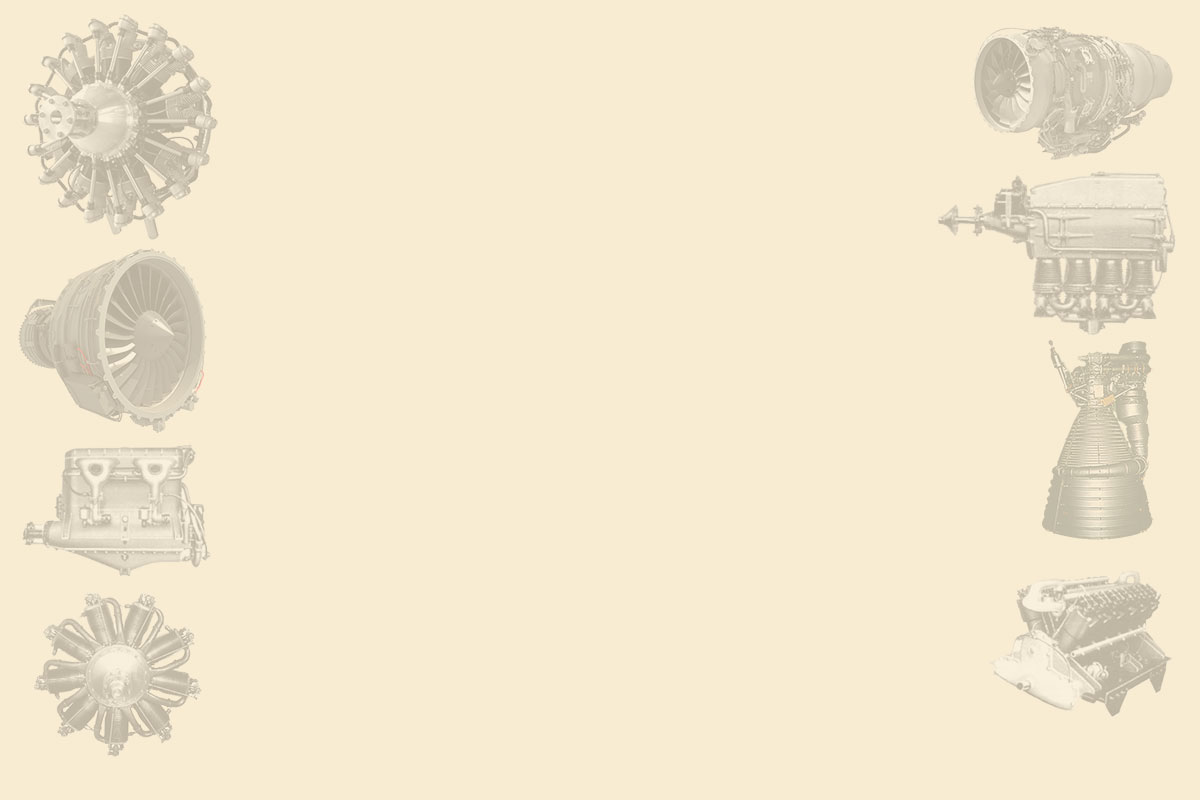Updated: 09-Sep-2024
Subaru is the brand of cars built by Fuji Jukogyo Kabushiki Kaisha or Fuji Heavy Industries Ltd, of Tokyo.
-Fuji was founded in 1953 as the successor of the well-known Nakajima (see).
-Since 1966, horizontally-opposed, four- and six-cylinder engines have been applied through conversions carried out by various manufacturers for light aviation, home-built, experimental, etc.

“Logo Subaru”
-It should be noted here again that Fuji's small industrial engines, the Robins, were marketed under this name and they have been used on ULM and motorized paragliders.
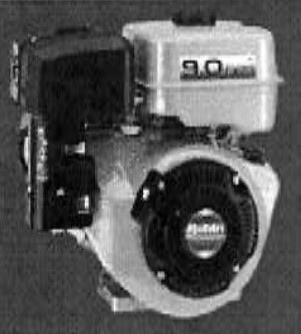
“Fuji-Robin”
-Just like the two- and three-cylinder Fuji 340 engines, they are also adapted for aviation.
-But let's focus on the aspect of Fuji that interests us for this chapter: Subaru.
-The engines of normal cars, sports cars and high-performance cars that we see every day at rallies are the ones that have been converted.
-The models we see are: the EA-52 from the cars from 1966 to 1970, mounted on the Yuichi OG-2 aircraft.
-The EA-61 that was installed on the Nihon University Cygnus.
-The EA-63 engine from the vehicles built from 1978 to 1989 was used on the Taylor Bird aircraft.
-The EA-71 was used on the Taylor Bird 2.
-We come to one of the most converted engines, the EA-81. This one has had versions such as EA-81-108 or EA-81-150, giving 108 HP and 150 HP. The latter, naturally, with a turbo.
-Among the list of applications, the following stand out: Gyrocopters, Gyroplanes and Rotorcrafts. With minor differences, they are all the same: Gyroplanes. For example, the Tomair Cobra Arrow from Australia.
-The Paxman Viper P3/A, Rotary RAF 2000 and Ultravia Pelican from Canada. In the USA, the Airdale, Barnett, GyroKopp-Ters, Mosquito Hawk, Joe Souza Bandit and Super Banmdit. NA Pitbull SS and II, Hawk Falcon, Taylor Byrd, Viking Dragonfly, etc.
-The EA-82 follows the behavior of the EA-81, being installed alternately. The EA-81 and 82 were used in various cars and vans, from 1980 to 1999.
-The EJ-18 was also converted, although no application has been found. From 1986 to 1996.

“Subaru on gyrocopter”
-The EJ-20WRX built in the WRX sedans from 2002 to the present, has been used by Crossflow.
-Another engine of singular acceptance among those dedicated to conversion has been the EJ-22, from the Legacy and Impreza cars.
-To give some data, like all the previous ones, they are horizontally-opposed,four-cylinder engines (boxer). They are liquid cooled and give 130 HP.
-They are converted by companies such as Crossflow, NSI, Reductions, Stratus 2000 and Subie-Lyc. (see all).
-Their applications are on countless flight machines, most of the autogiro type.
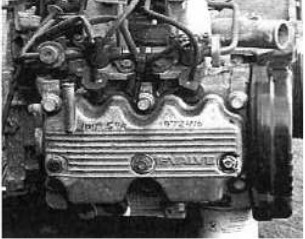
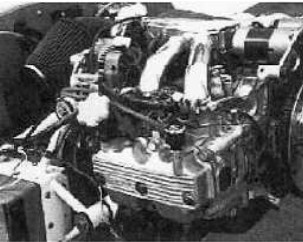
“Two EJ-22 views”
-The EJ-25 is the engine of the Forester, Impreza RS, Legacy and Outback cars from 1999 to today and of the SUS models as well as the Bajas that have been built since 2003.
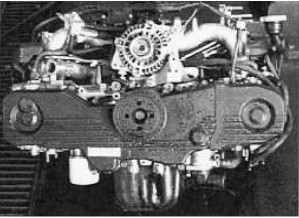
“EJ-25”
-The EJ-25 four-cylinder gives 165 HP and like the EJ-22 it has 16 valves, that is, four per cylinder.
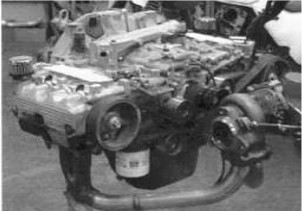
“Subaru EJ with turbo”
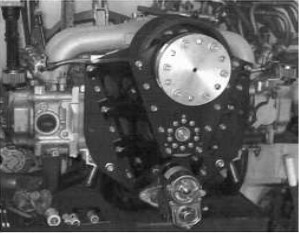
“Subaru engine with PSRU reduction gear”
-We see the reduction gear that has been installed on this Subaru, of the timing belt type. (Propeller Speed Reduction Unit = PSRU).
-Now we move on to the 6-cylinder horizontal engines. We are aware of three models that have been chosen for adaptations.
-The ER-27 from the XT Sport Coupé, from 1988 to 1991.
-With the same cylinders, bore and stroke as the EA-81 and EA-82.
-They have been seen on the Moulton Taylor Coot amphibious aircraft.
-The EZ-30 is the one used by the Legacy and the Outback from 2001 to the present.
-This engine is also known as the H6-30. It has been adapted by Eggenfellner (see).
-As a curiosity, we show three steps of the modification of a six-cylinder, in this case twin-turbo.

“A Subaru six-cylinder twin-turbo engine”
-Subaru engines in countries like Russia have also been adapted but the information is scant.
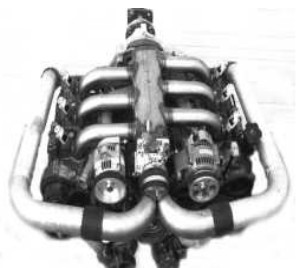
“Top rear view”
-Note the long path of the intake ducts, from the two lower turbos to the intercoolers at the front, to return back over the engine and enter a splitter manifold for each cylinder.
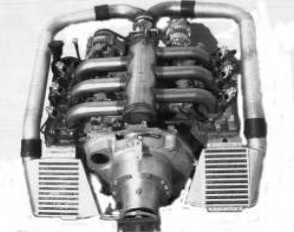
“Top front view”
-In this above illustration we can see the mechanical type reduction gear.
-We finish by listing those who have dedicated themselves to the conversions of these engines and who are missing on the previous page, such as Eggenfellner, I’m Fly’n Manufacturing, MDB Aerospace, RAM Performance, Sub4.
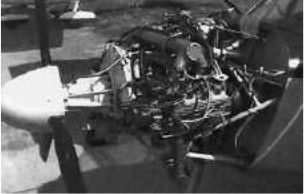

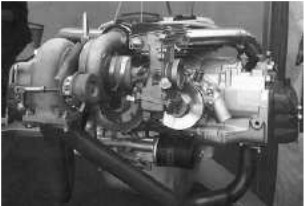
“Three examples of Subaru for ULM/VLA”
-Now we show a Subaru engine as it is in the car factory before proceeding to the modification to build it into an aircraft.

“Subaru engine before its modification”
From Appendix 6: A new engine, now Diesel, enters the game of engines that are adapted for light aviation.
-This is the Diesel Boxer with Turbocharger.
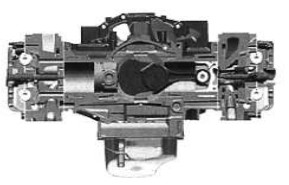
“Cutaway drawing of the Subaru boxer engine”
-And a view of the engine partially sectioned to observe its internals. Above it is the Intercooler, or heat exchanger of the air that comes out of the turbo.
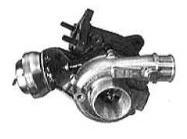
“Turbocharger assembly”
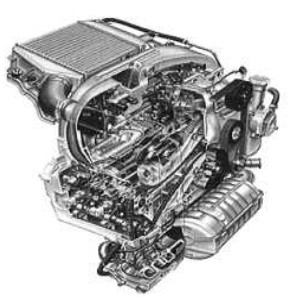
“Compact assembly of the Diesel Boxer”
-The turbo is similar to most modern ones and has the gas bypass step, or Waste Gate control, incorporated.
From Appendix 9: The brand's modern logo with gold borders, black background and blue-white stars.
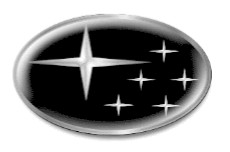
“Subaru logo”
From Appendix 12: A new application of the Subaru EJ-22 engine. This is an extension for the propeller according to the aerodynamics of the aircraft it is intended for.
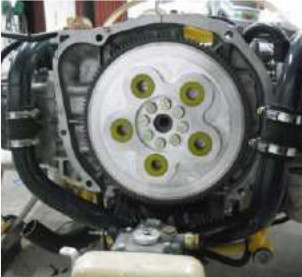
“Extension-coupling base”
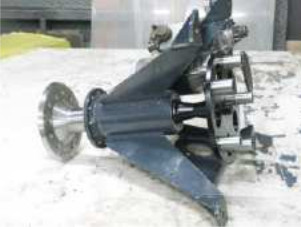
“The extension seems well resolved”
-This extension reminds the author of the one made for the Russian M-25 engine of the I-16, when they were built in Jerez for the 10 series.
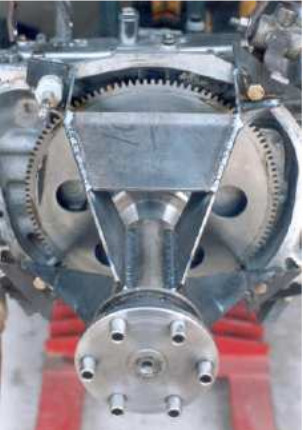
“Installed on the Subaru EJ-22”
-The EA-81 engine (the most aircraft-equipped of the brand) has another application in this next one from the Czech Republic.
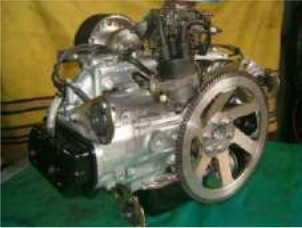
“The Subaru, seen from behind” (PiP)
-Another aviation modification of the Subaru EJ-25.

“Subaru EJ-25” (PiP)
Motores de SUBARU
Model: EA-52
Arquitecture:
Cooling:
Total Displacement:
Bore / Stroke: x
Power:
Weight:
Model: EA-61
Arquitecture:
Cooling:
Total Displacement:
Bore / Stroke: x
Power:
Weight:
Model: EA-63
Arquitecture:
Cooling:
Total Displacement:
Bore / Stroke: x
Power:
Weight:
Model: EA-71
Arquitecture:
Cooling:
Total Displacement:
Bore / Stroke: x
Power:
Weight:
Model: EA-81
Arquitecture:
Cooling:
Total Displacement:
Bore / Stroke: x
Power:
Weight:
Model: EA-82
Arquitecture:
Cooling:
Total Displacement:
Bore / Stroke: x
Power:
Weight:
Model: EJ-18
Arquitecture:
Cooling:
Total Displacement:
Bore / Stroke: x
Power:
Weight:
Model: EJ-20WRX
Arquitecture:
Cooling:
Total Displacement:
Bore / Stroke: x
Power:
Weight:
Model: EJ-22
Arquitecture:
Cooling:
Total Displacement:
Bore / Stroke: x
Power:
Weight:
Model: EJ-25
Arquitecture:
Cooling:
Total Displacement:
Bore / Stroke: x
Power:
Weight:
Model: EJ-27
Arquitecture:
Cooling:
Total Displacement:
Bore / Stroke:
Power:
Weight:
Model: EZ-30 (H6-30)
Arquitecture:
Cooling:
Total Displacement:
Bore / Stroke: x
Power:
Weight:
Model: Fuji-Robin 340
Arquitecture:
Cooling:
Total Displacement:
Bore / Stroke: x
Power:
Weight:
